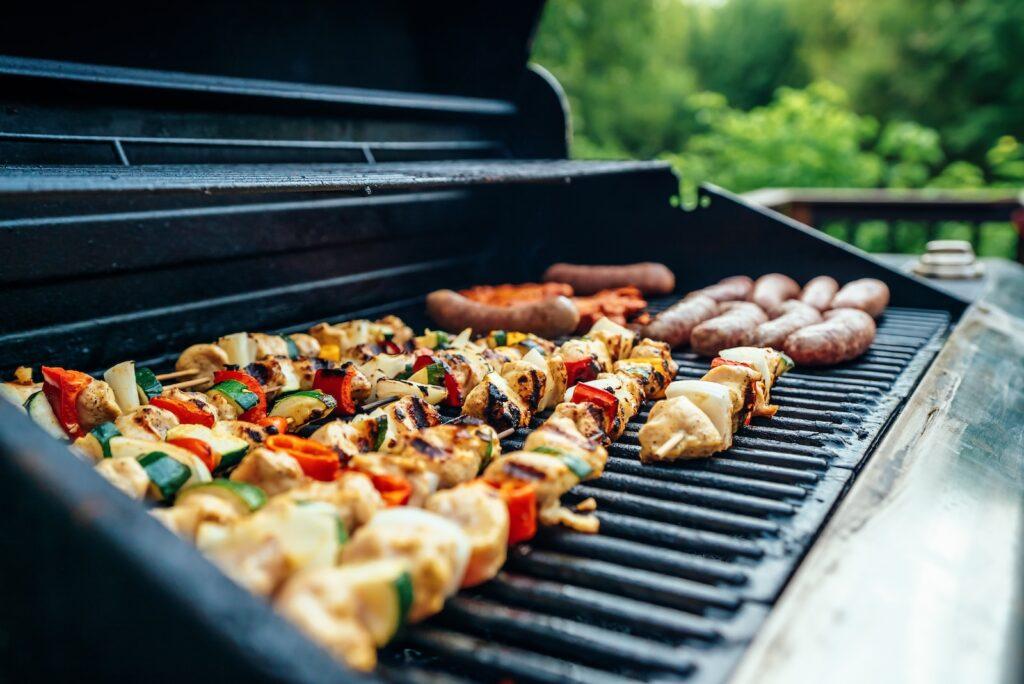Rated & Reviewed is reader-supported. When you buy through links on our site, we may earn an affiliate commission. Learn more.
Choosing Between Gas and Charcoal Grills
Choosing the right grill for your outdoor cooking needs can be challenging, especially when there are so many options available. Two of the most popular types of grills are gas and charcoal, and each has its benefits and drawbacks. In this article, we’ll look at gas vs. charcoal grills to provide guidance on factors to consider when deciding between a gas grill and a charcoal grill, such as personal preference, cooking style, budget, and maintenance requirements.

Personal Preference
The most crucial factor to consider when choosing between a gas or charcoal grill is your personal preference. Think about the flavors you want to achieve, the type of cooking experience you enjoy, and the convenience level you’re looking for. If you’re someone who likes the smoky flavor of outdoor grilling, then a charcoal grill may be the best choice for you. However, if you’re looking for a more convenient and modern cooking experience, a gas grill may be a better fit.
Cooking Style
Another factor to consider is your cooking style. Do you enjoy slow cooking, or do you prefer to grill your food quickly at high temperatures? Charcoal grills are better for slow cooking because they can maintain a lower, more consistent heat for longer. On the other hand, gas grills provide faster and more precise temperature control, making them ideal for searing meats and cooking delicate foods.
Budget
Your budget is another crucial factor to consider when choosing between a gas or charcoal grill. Gas grills can be more expensive to purchase initially, but they’re often less expensive to operate over time because you don’t need to buy charcoal or wood for fuel. Charcoal grills, on the other hand, are typically less expensive to purchase, but you’ll need to continually buy charcoal or wood to fuel the grill.
Maintenance Requirements
Finally, consider how much maintenance you’re willing to put into your grill. Gas grills require regular cleaning and maintenance to keep them running correctly, while charcoal grills require more attention and care to ensure they’re safe to operate. If you’re someone who wants a low-maintenance grill, a gas grill may be a better option.
Let’s take a look at some of the pros and cons of each:
Pros and Cons of Gas Grills
Gas grills are a popular choice among outdoor cooking enthusiasts because of their convenience, speed, and ease of use. However, they also come with some downsides. In this article, we’ll explore the pros and cons of gas grills to help you decide if it’s the right choice for you.
Pros of Gas Grills
Here are some of the benefits of using a gas grill:
1. Convenience
Gas grills are incredibly convenient to use because of their instant ignition and fast heating times. With a push of a button, you can start your gas grill and be cooking in a matter of minutes. You don’t need to worry about lighting charcoal or wood and waiting for them to heat up.
2. Temperature Control
Gas grills provide precise temperature control that allows you to adjust the flame and heat output to suit your cooking needs. This is especially useful when cooking delicate foods that require low and slow cooking or when searing meats at high temperature.
3. Ease of Use
Gas grills are straightforward to use, and you don’t need any special skills to operate them. This makes them an excellent choice for beginners or those who don’t have the time or patience to master the art of charcoal grilling.
4. Cleaner Burning
Gas grills burn cleaner than charcoal grills, which means they produce fewer emissions and less smoke. This makes them a more eco-friendly choice and ensures that your food doesn’t absorb any unwanted flavors from the fuel.
Cons of Gas Grills
Despite their many benefits, gas grills also have some drawbacks, including:
1. Lack of Flavor
One of the most significant downsides of gas grills is that they don’t impart the same smoky flavor to food that charcoal or wood-fired grills do. This can be a deal-breaker for some people who love the taste of outdoor grilling.
2. Cost
Gas grills can be more expensive to buy than charcoal grills, and they require a gas line or propane tank, which can add to the overall cost.
3. Maintenance
Gas grills require more maintenance than charcoal grills because they have more moving parts, such as burners and igniters. You’ll need to clean the grill regularly and replace any worn-out parts regularly.
Overall, gas grills are a convenient and practical choice for outdoor cooking, and they offer several benefits such as temperature control, ease of use, and cleaner burning. However, they may not be the best choice if you’re looking for a smoky, wood-fired flavor. Ultimately, the decision between a gas or charcoal grill comes down to personal preference, cooking style, budget, and maintenance requirements.
Pros and Cons of Charcoal Grills
Charcoal grills offer a unique grilling experience that many outdoor cooking enthusiasts love. However, they also come with some potential drawbacks that you should consider before purchasing one. In this article, we’ll explore the pros and cons of charcoal grills to help you decide if it’s the right choice for you.
Pros of Charcoal Grills
Here are some of the benefits of using a charcoal grill:
1. Flavor
Charcoal grills impart a smoky flavor to food that many people find synonymous with outdoor grilling. The flavor comes from the smoke generated by the burning charcoal, which can create a unique taste that you can’t achieve with other grill types.
2. Traditional Cooking Experience
Using a charcoal grill is a more traditional way of cooking outside that can be fun and rewarding. Many people enjoy the hands-on experience of starting a fire, monitoring the temperature, and adjusting the flames as needed.
3. Versatility
Charcoal grills are highly versatile and can be used to cook a wide range of foods, including meats, vegetables, and even pizza. You can also change the flavor of your food by using different types of charcoal, such as hardwood, mesquite, or hickory.
Cons of Charcoal Grills
Despite their many benefits, charcoal grills also come with some potential downsides, including:
1. Longer Preheating and Cleanup Time
Charcoal grills require more time to preheat than gas grills, which can be frustrating if you’re in a hurry. Additionally, cleaning up after grilling can be a messy process that takes longer than with a gas grill.
2. Temperature Control
Charcoal grills can be more challenging to control than gas grills because the heat output is less precise. You’ll need to pay close attention to the temperature and adjust the charcoal as needed to maintain an even heat.
3. Smoke
While the smoky flavor is a significant benefit of charcoal grills, the smoke can also be a downside. Excessive smoke can be annoying to your neighbors, and it can also be harmful to your health if you inhale too much
Charcoal grills offer a unique grilling experience that many people enjoy for the flavor, tradition, and versatility they provide. However, they also require more time and effort to operate, and temperature control can be challenging. Ultimately, the decision between a gas or charcoal grill comes down to personal preference, cooking style, budget, and maintenance requirements.
Wrapping It Up
Choosing between a gas or charcoal grill ultimately comes down to personal preference, cooking style, budget, and maintenance requirements. Both types of grills offer unique benefits and drawbacks, so it’s essential to think carefully about your needs and preferences before making a purchase. Consider all the factors we’ve discussed in this article to make an informed decision that will provide you with the perfect grilling experience.
Amazon and the Amazon logo are trademarks of Amazon.com, Inc, or its affiliates.


